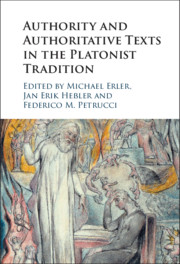Book contents
- Authority and Authoritative Texts in the Platonist Tradition
- Authority and Authoritative Texts in the Platonist Tradition
- Copyright page
- Contents
- Figures
- Contributors
- Acknowledgements
- Abbreviations
- Introduction
- Chapter 1 Xenocrates’ Invention of Platonism
- Chapter 2 An Iconography of Xenocrates’ Platonism
- Chapter 3 Arcesilaus’ Appeal to Heraclitus as a Philosophical Authority for His Sceptical Stance
- Chapter 4 Authority beyond Doctrines in the First Century bc
- Chapter 5 Authority and Doctrine in the Pseudo-Pythagorean Writings
- Chapter 6 Constructing Authority
- Chapter 7 Plutarch’s E at Delphi
- Chapter 8 Aristotle’s Physics as an Authoritative Work in Early Neoplatonism
- Chapter 9 Conflicting Authorities? Hermias and Simplicius on the Self-Moving Soul
- Chapter 10 Kathēgemōn: The Importance of the Personal Teacher in Proclus and Later Neoplatonism
- Chapter 11 ‘In Plato we can see the bad characters being changed by the good and instructed and purified.’
- References
- Index Locorum1
- General Index
Chapter 5 - Authority and Doctrine in the Pseudo-Pythagorean Writings
Published online by Cambridge University Press: 19 February 2021
- Authority and Authoritative Texts in the Platonist Tradition
- Authority and Authoritative Texts in the Platonist Tradition
- Copyright page
- Contents
- Figures
- Contributors
- Acknowledgements
- Abbreviations
- Introduction
- Chapter 1 Xenocrates’ Invention of Platonism
- Chapter 2 An Iconography of Xenocrates’ Platonism
- Chapter 3 Arcesilaus’ Appeal to Heraclitus as a Philosophical Authority for His Sceptical Stance
- Chapter 4 Authority beyond Doctrines in the First Century bc
- Chapter 5 Authority and Doctrine in the Pseudo-Pythagorean Writings
- Chapter 6 Constructing Authority
- Chapter 7 Plutarch’s E at Delphi
- Chapter 8 Aristotle’s Physics as an Authoritative Work in Early Neoplatonism
- Chapter 9 Conflicting Authorities? Hermias and Simplicius on the Self-Moving Soul
- Chapter 10 Kathēgemōn: The Importance of the Personal Teacher in Proclus and Later Neoplatonism
- Chapter 11 ‘In Plato we can see the bad characters being changed by the good and instructed and purified.’
- References
- Index Locorum1
- General Index
Summary
Within the Pythagorean tradition the supreme source of authority is, needless to say, Pythagoras himself. The Pythagoreans are the only Pre-socratics named after the founder of their brotherhood. However, if one takes into account the amount of extant Pythagorean literature, which is for the most part apocryphal – as is well known, the amount of apocryphal Pythagorean literature by far exceeds the few fragments which can be considered authentic and safely attributed to ancient Pythagoreans – the predominant name is that of Archytas, who was undoubtedly a prominent figure, although not one as authoritative as Pythagoras. Moreover, a great number of pseudo-Pythagorean writings go under the name of largely unimportant, or otherwise unknown, authors. Nonetheless, this apocryphal literature considerably contributed to lending the necessary authority to a very influential tradition that extended over the centuries. In this contribution I will endeavour, among other things, to explain (a) how Archytas came to be regarded as a major source of authority; (b) why the authors of Pythagorean forgeries made recourse to names which apparently were anything but authoritative; (c) more broadly, what kind of criteria may have guided the authors in building the pseudo-Pythagorean corpus; (d) what relationship exists between these writings and the Platonist tradition.
- Type
- Chapter
- Information
- Authority and Authoritative Texts in the Platonist Tradition , pp. 115 - 129Publisher: Cambridge University PressPrint publication year: 2021



